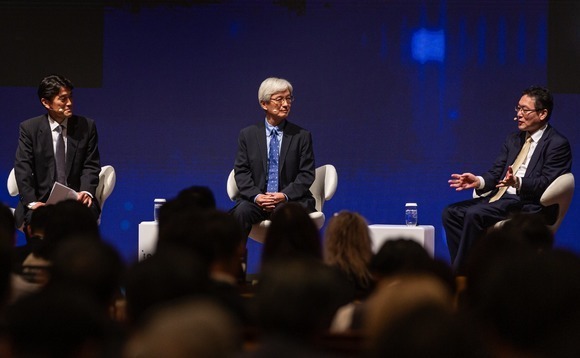
Japan's JST builds $451m alternatives portfolio in debut year

University endowment Japan Science & Technology Agency (JST) put JPY 9.96trn (USD 69.7bn) to work in its first 12 months in operation, with JPY 64.3bn going into alternatives.
Of the allocation to alternative assets, JPY 29.8bn went into private equity, JPY 13.1bn into real estate, and JPY 7bn into infrastructure, according to the endowment's annual report. All these commitments went through gatekeepers, with Neuberger Berman accounting for half of the total. Sumitomo Mitsui Trust Bank and Mitsubishi UFJ Trust & Banking are the other gatekeeper relationships.
Speaking at the AVCJ Private Equity & Venture Forum Japan 2023, Tadasu Matsuo (pictured, centre), head of global alternative investments at JST, identified secondaries and private debt as areas of interest.
"We need to generate returns from the first year, which is not an easy thing to do. We will try to mitigate the j-curve effect as much as possible, so we are thinking about secondaries," Matsuo said. "And given the current environment, we will allocate more to private debt and direct lending. We will look to adapt to any kind of environment."
The alternatives portfolio did end year one in positive territory, generating JPY 5bn. The overall portfolio was down by JPY 60.4bn due to a JPY 126.3bn loss on global bond holdings. Global equities and alternatives generated JPY 65.5bn.
Alternatives amounted to 0.6% of JST's overall portfolio as of March 2023. Global bonds, global equities, and short-term assets made up the rest, with 54.6%, 17.2%, and 27.6%, respectively. Masakazu Kita, the endowment's CIO, said in the annual report that relatively high exposure to short-term assets is intended to allow flexibility in the timing of investments, given the volatile market environment.
The endowment operates under a reference portfolio – split 65-35 between global equities and global bonds – that is used to determine an acceptable level of risk. Based on these parameters, a basic portfolio is set with a view to achieving the endowment's investment goals.
JST has a target return of 3% plus inflation, which peaked at 4.3% in January but had moderated to 3.2% as of May. (Japan's Government Pension Investment Fund has a target return of 1.7%.) JST's target will not kick in until 2031 at the earliest to allow for the construction of a basic portfolio, although the portfolio is expected to generate annual investment income of JPY 300bn as early as 2026.
Alternatives are expected to play an increasingly prominent role in JST's portfolio, and Matsuo indicated that he would continue to expand his team, which is currently 13-strong.
"We need to generate high returns in the mid to long-term, so buyouts will be at the centre of what we do," Matsuo added, noting that portfolio construction will be a lengthy process with an emphasis on diversification. JST will also pursue co-investment.
The endowment was initiated in 2021 after government research established that Japanese universities required around JPY 300bn in annual support to become world-class research hubs. This is intended to be a response to the perceived stagnation of Japanese universities versus their global peers across criteria such as the number of research papers published.
The Ministry of Education, Culture, Sports, Science & Technology linked this relative decline to universities in Europe and the US pumping endowment proceeds into research infrastructure. In 2019, Harvard University's endowment was worth JPY 4.5trn, Yale University had JPY 3.3trn, the University of Cambridge had JPY 1trn, and the University of Oxford had JPY 820bn.
In 2020, University of Tokyo, Waseda University, and Keio University had endowments of JPY 15bn, JPY 30bn, and JPY 87bn, respectively.
Latest News
Asian GPs slow implementation of ESG policies - survey
Asia-based private equity firms are assigning more dedicated resources to environment, social, and governance (ESG) programmes, but policy changes have slowed in the past 12 months, in part due to concerns raised internally and by LPs, according to a...
Singapore fintech start-up LXA gets $10m seed round
New Enterprise Associates (NEA) has led a USD 10m seed round for Singapore’s LXA, a financial technology start-up launched by a former Asia senior executive at The Blackstone Group.
India's InCred announces $60m round, claims unicorn status
Indian non-bank lender InCred Financial Services said it has received INR 5bn (USD 60m) at a valuation of at least USD 1bn from unnamed investors including “a global private equity fund.”
Insight leads $50m round for Australia's Roller
Insight Partners has led a USD 50m round for Australia’s Roller, a venue management software provider specializing in family fun parks.








